1950s Hong Kong childhood
Primary tabs
Chris Hall spent three years here in the 1950s, and has kindly shared these family photos:
The captions come from the notes that Chris's mother Isabel Lily (known as "Billy") wrote on the back of each photo. In late 2003 she also wrote down her memories of those years in Hong Kong, which you can read below.
Her story begins with the family living in the Sudan, where Chris was born.
Khartoum + Cricket = Hong Kong
When all the British officials in the Sudan received 2 months notice on New Year's Day in 1955, everybody had to apply frantically for jobs. Among the many that Henry sent off to was one to Hong Kong University as assistant bursar. He mentioned that he played cricket.
Sir Lindsay Ride, the Vice Chancellor of the University of Hong Kong was a great cricket fan, and so was his friend and fellow Australian, the Vice Chancellor of Khartoum University. Sir Lindsay contacted him and mentioned Henry's application. On receiving a complimentary report he visited his friend in Khartoum on a sea trip to England and had an interview with Henry at the same time.
The Khartoum Vice Chancellor was captain of the cricket team and confirmed that Henry was a very good cricketer so he was offered the job provided he played cricket for the university team. That was how we came to Hong Kong. We got the cable on the ship in the Red Sea on our way home to England.
Sailing to Hong Kong
We set off for Hong Kong on a German boat from Southampton, I have forgotten the name. It was the height of the monsoon season. It was terribly hot and humid and very little air conditioning. It wasn't like the modern cruise ships. Great gaps in the side of the ship. I had to be very careful of Christopher who was 3 years old. He jumped into the pool once and had to be rescued.
There were very few passengers, probably because of the time of year. However, they were a friendly lot and we amused ourselves with fancy dress competitions, charades, etc.
We called at Ceylon where there was a marvelous zoo full of flowers and shrubs beautifully maintained. The animals were well looked after and very free. We called there again a few years later when it had become Sri Lanka, but it was very neglected and Colombo was very scruffy looking.
On to Singapore - I was thrilled with this. Men looking like Indian princes opening doors for us. We were greeted with very decoratively dressed natives offering us rides on rickshaws. We enjoyed Raffles and the Long Bar. Went to a very glamorous place to dance in the evening. Also enjoyed shopping in Change Alley where everything was very cheap. However, all the passengers told me that Hong Kong was the Pearl of the Far East. I had seen nothing yet.
(I forgot to mention that I was quite shocked to see that all the men wore long trousers. In Africa all the men wore white shorts and white shirts, very smart and suitable for the climate. You put a tie on when you went to see the boss in Africa.)
Arriving in Hong Kong
As we sailed into that beautiful harbour, everybody went mad. It was so lovely. Lights everywhere - it was nighttime. All kinds of boats and the most fascinating signs with exotic Chinese names wherever you looked. I had the feeling that this was it. What I had always dreamed about.
It was 11pm and the Bursar came on board to take us ashore. I protested that we couldn't wake up Christopher at that hour. Surely it could wait until the next morning. He agreed but it was only later that we learned that Henry had missed a whole month's salary through this as it was the 31st May. Henry was very upset about it.
Living at Hong Kong University
We were taken to the Bursar's house which was called "Buckingham Palace" as it was the largest block for professors or their equal in seniority, and stood on top of the university compound which rose from the bottom of the mountain. The compound was all up the mountain with a few houses on it and with beautiful views of the islands, the sea and mountains. The compound itself was well laid out, a wonderful place for children to play. Most of it is built over now.
We had to stay at the Bursar's place for a time. His wife was in England putting their son to boarding school. We were not very popular. There was water rationing and of course I left a tap on and flooded the place.
I had asked for a girl to look after Christopher for me. I had heard they were very good. Unfortunately the cook boy introduced his girlfriend. Arthur, the Bursar, used to put all the bills that the cook boy brought by his chair on a table. The so called children's nurse was asleep and Chris picked up all the papers and threw them out of the window. It was a wonder that Christopher didn’t throw himself over. Arthur decided Christopher was the naughtiest boy he had ever come across. After that it was discovered that the cook's girlfriend didn't like children and didn't want the job. So by this time I had found a very good girl to cook for me and look after the house and a very nice girlfriend to look after Chris.
Soon we moved into our own place just below. A lovely view of course, being up on the mountain.
One of the professors' wives ran a nursery school. It was just across the compound and Chris loved it.
There was a tennis court in the university compound and I soon found some fellow enthusiasts. I particularly played with Flo McFadgeon, the medical professor's wife and Monica Hodges, the surgeon's wife.
Working in Hong Kong
I had found myself a job with Government and was earning money once again. I had to drive to work in Central, plenty of parking spaces. We bought a green Ford Prefect as soon as we arrived. Henry just had to walk down the garden path to his office.
I got rather bored working for Government after a time. There really wasn't enough to do and i wanted some spare afternoons for swimming or tennis. I got a job as secretary to the Children's Playground Association in Wanchai. It is still going strong. I took over from a manager and secretary and did the job in half the time.
It suited me very well. As long as I got the work done, the committee I was answerable to were happy. I could take Christopher everywhere with me. He was just one child among many. I had playgrounds to inspect in Kowloon as well as Hong Kong.
There were evening meetings of course, on Kowloon side as well as Hong Kong. All the committee were busy people.
Out and about
I found the shopping fascinating. Along Queen's Road Central there were lots of little shops selling beautiful embroidery and trinkets. I used to send a parcel to mother every month. There were lots of little souvenir shops up side streets of Queen's Road Central full of lovely hand embroidered things, beautifully made nic-nacs. Everything was very cheap. I found marvelous clothes in the little side streets called the lanes. Also a market called Cloth Alley full of wonderful materials, very cheap. I was introduced to a very good tailor. He used to come into my house when it suited me.
From the university there was a lovely coast road like Cornwall to Deep Water Bay beach, very different now of course. Deep Water Bay beach was a very safe and lovely place to swim, nearly always very calm water. Christopher learned to swim there.
Time to leave
I thought Hong Kong a paradise. Henry wasn't so happy though. Arthur was not interested in sport, only in work, and he made it very difficult for Henry to play cricket. However, the Vice Chancellor ensured that Henry was always free to play cricket for the university. (Henry also played for the Hong Kong Veteran Team). Henry played cricket at the Cricket Club in Central, now replaced by a rather ugly park with a large bare space in the middle.
At the end of Henry's contract, he was put on the permanent staff. To my great shock we were contemplating a four year term before going on leave. Henry said we must put Christopher to boarding school. I couldn't bear the thought of parting with him for 4 years.
Henry didn't like working for Arthur Wilson much. He obtained a job in Nigeria where they gave annual air passages to send children to school in London, and leave after 2 years.
When we left Hong Kong in 1958, we steamed straight into the middle of a typhoon. That was a time when big farewell parties took place. So we had a big sendoff. At the farewell gathering we were smothered with flowers etc. When the typhoon started everything took off. Plants and flowers were whirling round the cabin. Henry was flat on his back as he got seasick. I ordered Christopher to get on his bed as I didn’t want him injured and he was very light. I don't get very seasick so I managed to collect the debris and put it is the bathroom and close the door.
Mr and Mrs Hall spent several years in Africa, but moved back here in 1968. Chris also returned in the 1970s, and the family made Hong Kong their home.
Thanks to Chris for sharing his family's story with us. You can see more of his photos in the gallery 1950s Hall family's photos. If you have any photos to share we'd love to see them - here's how to upload them to Gwulo website.
|
If you have free time this weekend, I recommend a visit to the Hong Kong Collectors Society exhibition. New on Gwulo.com this week:
Readers ask for information (photos, facts, memories, etc.) about:
|
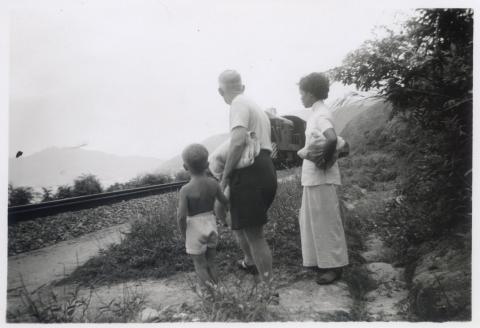
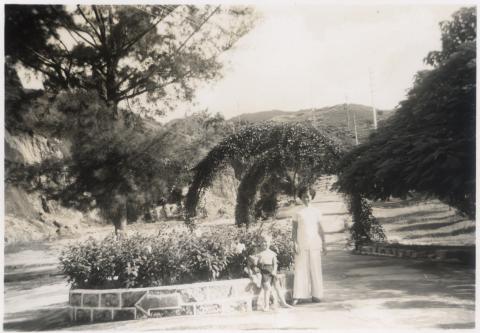
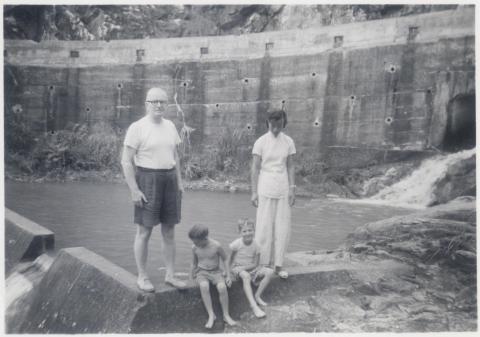
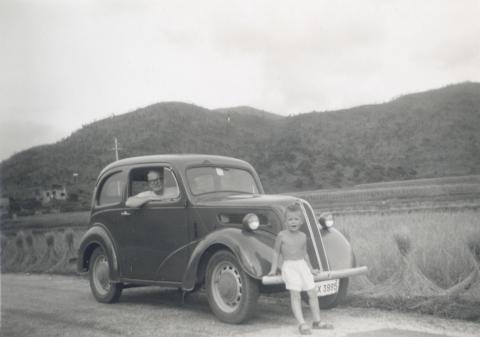
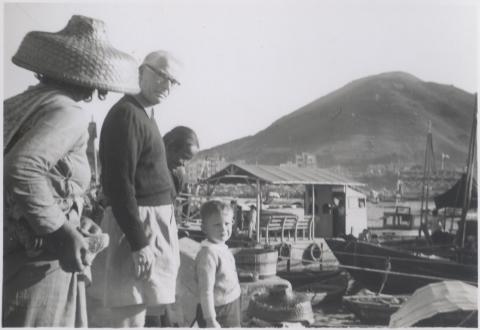
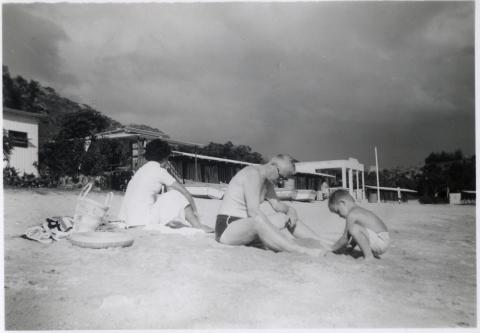
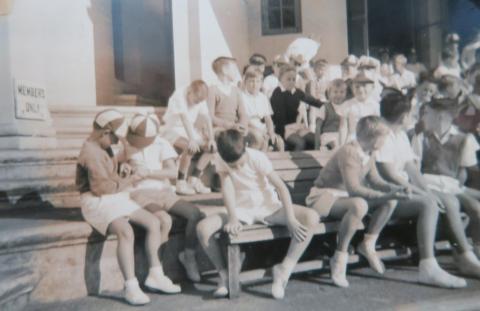
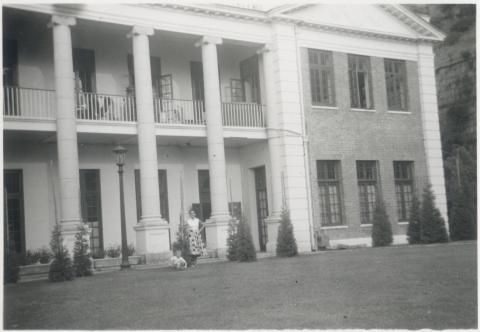
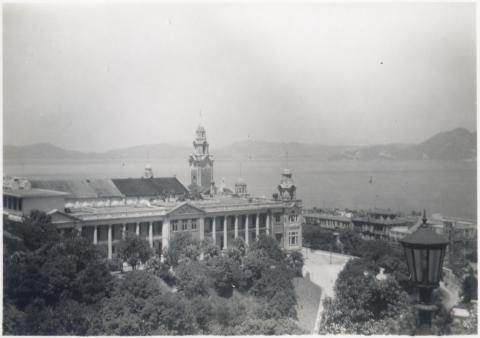
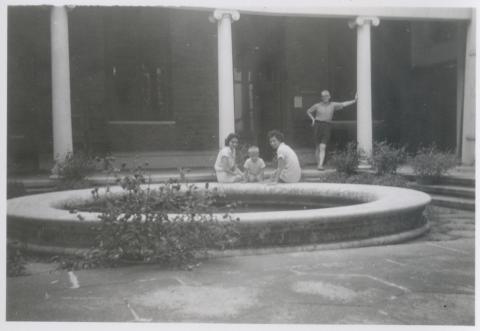
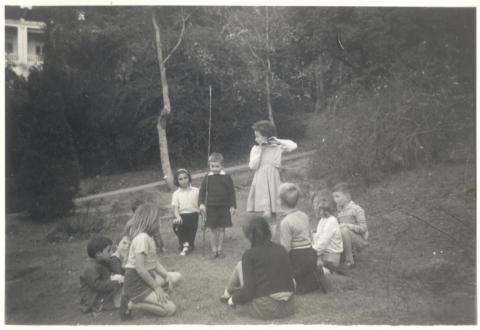
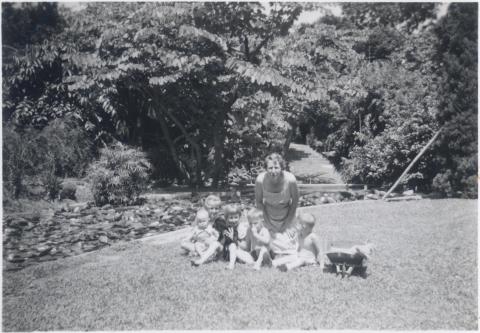
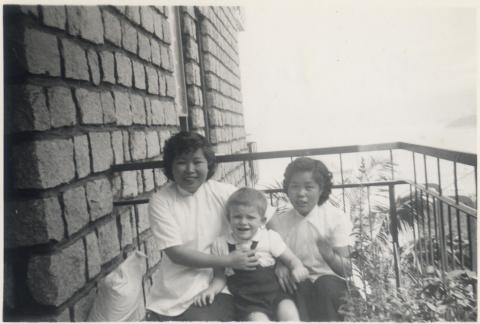
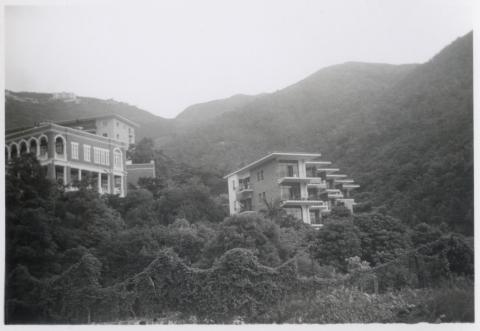
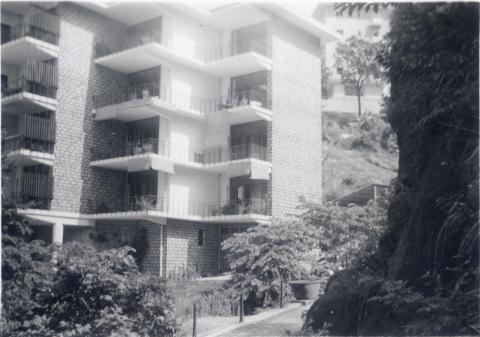
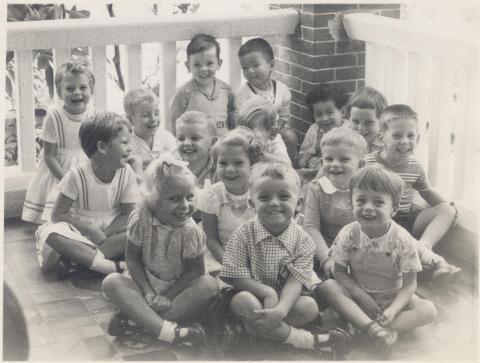
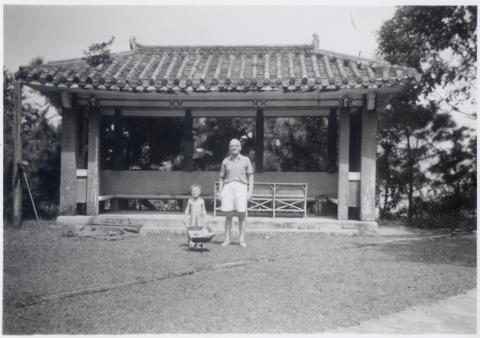
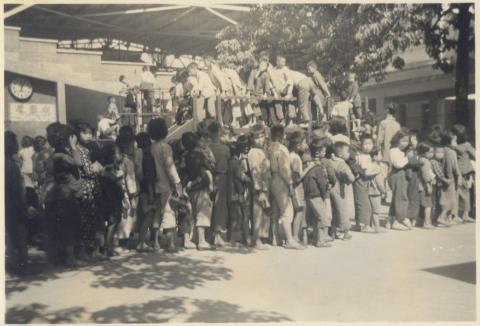
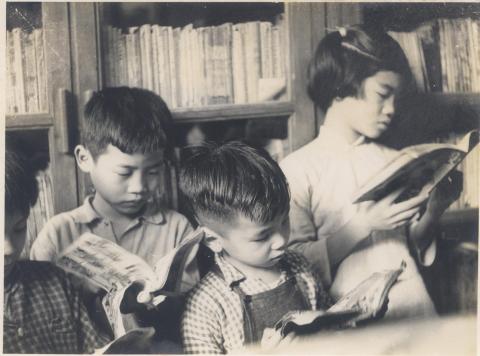
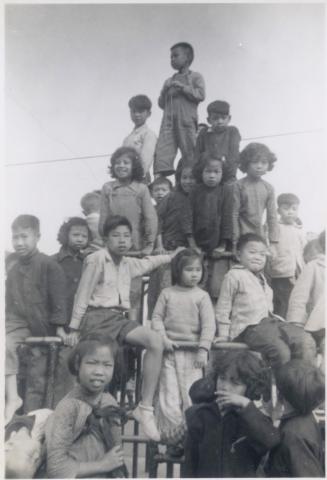
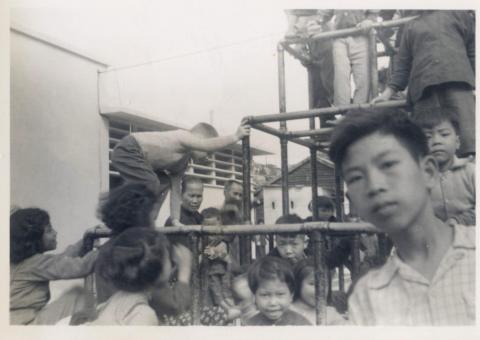
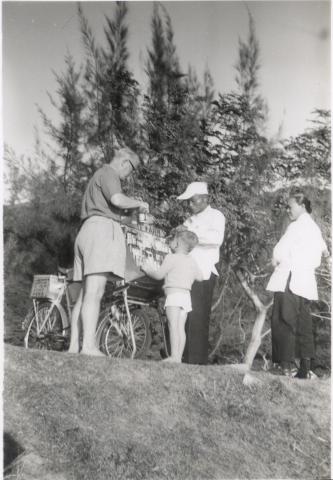
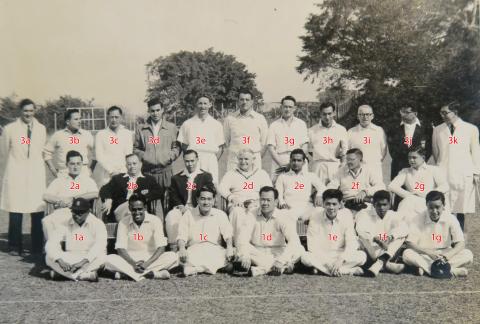

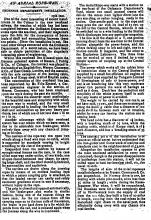
Comments
Maple Street Playground
Greetings. Thanks for showing the Maple Street Playground. I was living two blocks away at the time of this photo.
In the 1950s, there already was a wooden building housing the Sham Shui Po Kaifong (meaning street neighbourhood) Welfare Association. The rest of the city block was unpaved and used as soccer field, and kids biked there too. After learning how to ride a bike, I would circle round and around the perimeter and the bumps over rough spots were part of the fun.
The place became the centre of government relief and assistance program, in the form of food, shelter and financial support, for the people who lost their homes due to the 1953 Shek Kip Mei fire. Two years later, there were still some tents with people living in them; and inside the wooden office in 1960 displaced from home following other disasters. The wooden office was later replaced by a new high rise. Some time in the early 1960s, the playground was paved with asphalt allowing organized soccer competitions. On the north side of Cheung Sha Wan Road, one man operated his soccer ball repair business in a tiny space under the staircase. Along the centre of Yu Chau Street were clothing vendours and their permanent (not removed at night) stands.
In the 1950s to celebrate the Chinese New Year, a temporary opera stage was set up using bamboos and Cantonese shows presented, standing room only for spectators after all the seats were occupied.
The park on the east side came sometime in the early 1960s, covered with grass, a few small trees, and a winding walkway inside the perimeter. Small signs on the ground read "Please walk on the path". It was a gathering place for play-bird-men in the morning most of them seniors. There were several dai pai dong on Maple Street and one could watch the cook blowing air into the duck's cavity, sewing and hanging them to dry before roasting. When business was booming, you could see raw ducks drying on the playground's fence.
Lung Hing Temple was around the corner on Ki Lung Street taking up space on the top (level-3) floor and roof top. After the visit, temple goers would burn their offerings on what we called "Three-Corner-Ground) at the Maple-Ki Lung-Boundary junction. Regards, Peter